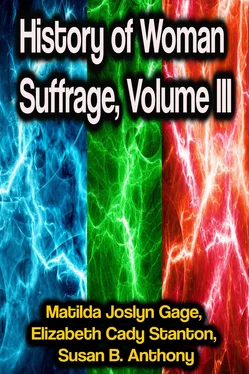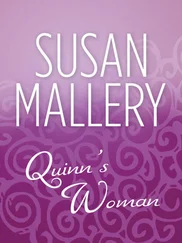Day after day visitors to the woman suffrage parlors referred to this meeting in glowing terms. Ladies from distant States, in Philadelphia to visit the exposition, said that meeting was worth the whole expense of the journey. Young women with all the attractions of the day and the exposition enticing them, yet said, "The best of all I have seen in Philadelphia was that meeting." Women to whom a dollar was of great value, said, "As much as I need money, I would not have missed that meeting for a hundred dollars"; while in the midst of conversation visitors would burst forth, "Was there ever such a meeting as that in Dr. Furness' church?" and thus was Woman's Declaration of Rights joyously received.
The day was also celebrated by women in convocations of their own all over the country.[15]
An interesting feature of the centennial parlors was an immense autograph book, in which the names of friends to the movement were registered by the thousands, some penned on that historic day and sent from the old world and the new, and others written on the spot during these eventful months. From the tidings of all these enthusiastic assemblies and immense number of letters[16] received in Philadelphia, unitedly demanding an extension of their rights, it was evident that the thinking women of the nation were hopefully waiting in the dawn of the new century for greater liberties to themselves.
From "Aunt Lottie's Centennial Letters to her Nieces and Nephews," we give the one describing this occasion:
My Dears: I suppose I had best tell you in this letter about the Fourth of July celebration at the centennial city—at least that portion of it that I know about, and which I would not have missed for the exhibition itself, and which I would not have you miss for all the rest of my letters. I cannot expect you to be as much interested in it as was I, but it is time you were becoming interested in the subject; and, if you live a half century from this time (in less than that, I hope,) you will see that what I am about to relate was, as General Hawley admitted it would be, "the event of the occasion."
At the commencement of the exhibition, Miss Susan B. Anthony and Mrs. Matilda Joslyn Gage came to Philadelphia and procured the parlors of 1,431 Chestnut street for the accommodation of the National Woman Suffrage Association. These rooms were open to the friends of the association, and public receptions were held and well attended every Tuesday and Friday evening. During these months these two ladies—assisted the latter part of the time by Mrs. Elizabeth Cady Stanton—were engaged in preparing a history of the suffrage movement and a declaration of rights to be presented at the great centennial celebration of the Fourth of July, 1876. This document is in form like the first declaration of a hundred years ago, handsomely engrossed by Mrs. Sara Andrews Spencer, of Washington—a lady delegate to the Cincinnati Republican convention, June 12.
The celebration was held in Independence Square, just back of the old state-house where the first declaration was signed. There was a great crowd of people collected; a poem was read by Bayard Taylor and a speech delivered by William M. Evarts. But I knew it was useless to go there expecting to hear any portion of either; so I waited until twelve o'clock and then rode down in the cars to Dr. Furness' church, corner of Broad and Locust streets, where these ladies were to hold their meeting. The church was full, and the exercises were opened by Mrs. Mott—the venerable and venerated president—a Quaker lady of slight form, attired in a plain, light-silk gown, white muslin neckerchief and cap, after that exquisitely neat and quaint fashion. Then the Hutchinsons sang a hymn, in which all were requested to join. Afterward Mrs. Stanton came to the front of the pulpit, the house was hushed, to a reverential stillness, and I never yet heard anything so solemn and impressive as her reading of the Declaration of Rights of the Women of the United States.
A printed copy had been given me the day before, when between the sessions of the New England American Association in the Academy of Music, where were Lucy Stone, Julia Ward Howe, Rev. Antoinette Brown Blackwell, Elizabeth K. Churchill and other pleasant-faced, sweet-voiced ladies, I had called at the rooms on Chestnut street and folded declarations, for half an hour with Mrs. Stanton, which they were distributing by post and in every way all over the land. When I read it at home that night I realized its importance, but as the next day (the Fourth) was excessively warm, I very nearly gave up going, and then I should have missed the impressiveness of her reading. When she first commenced, her voice seemed choked with emotion. She must have realized what she was doing, as we all knew it was the grandest thing that had been done in a hundred years. Thrill after thrill went through my veins, and the whole scene formed a picture that will yet be the subject of artists' pencils and poets' pens. I should have been contented to have had the meeting closed then with that best song of the Hutchinsons upon the progress of reform, where the young gentleman was so much applauded for his solo, "When Women Shall be Free." Still we were all interested in Mrs. Spencer's account of her interview with General Hawley, and his refusal to permit the silent handing-in of the declaration, which, after her persistence, assuring him "it would not take three minutes," he was obliged to confess was because he was "very well aware it would be the event of the occasion." "Immediately," said Mrs. Spencer, "you cannot imagine what an inspiration we all had to do it; for," added the slight, fair-haired, fluent lady, in a humorous manner that called forth laughter and applause, "I never yet was forbidden by a man to do a thing, but that I resolved to do it."
We were also pleased to hear from that earnest woman, Susan B. Anthony, inspired by the immutable abstract truths of justice and equity. Reports say that she has the air of a Catholic devotee. She said that in defiance of "the powers that be" she took a place on that platform in Independence square, and at the proper time delivered the engrossed copy of the declaration to the Hon. T. W. Ferry, who received it with a courteous bow; and afterward on the steps of Independence Hall she read it to an assembled multitude. She had done her centennial day's work for all time; and small wonder that mind and body craved rest after such tension. She is yet under a hundred dollars fine for voting at Rochester, and although from her lectures the last six years she has paid $10,000 indebtedness on The Revolution , she said she never would have paid that fine had she been imprisoned till now.
Mrs. Lucretia Mott, whom the younger Hutchinson[17] assisted into the pulpit—a beautiful sight to see cultured youth supporting refined old age—stated that she went up there, "not because she was higher-minded than the rest, but so that her enfeebled voice might be better heard." The dear old soul is so much stronger than her body, that it would seem that she must have greatly overtasked herself; though an inspired soul has wonderful recuperative forces at command for the temple it inhabits. A goodly number of gentlemen were present at this meeting and that of the day before—three or four of them making short speeches. A Mr. Raper of England, strongly interested in the temperance and woman suffrage cause, told us that in his country "all women tax-payers voted for guardians of the poor, upon all educational matters, and also upon all municipal affairs. In that respect she was in advance of this professed republic. In England there is an hereditary aristocracy, here, an aristocracy of sex"; or, as the spirited Lillie Devereux Blake who was present once amusingly termed it, of "the bifurcated garment." And now perhaps some materially-minded person will ask, "What are you going to do about it? You can't fight!" forgetting that we are now fighting the greatest of all battles, and that the weapons of woman's warfare, like her nature at its best development, are moral and spiritual.
Читать дальше












